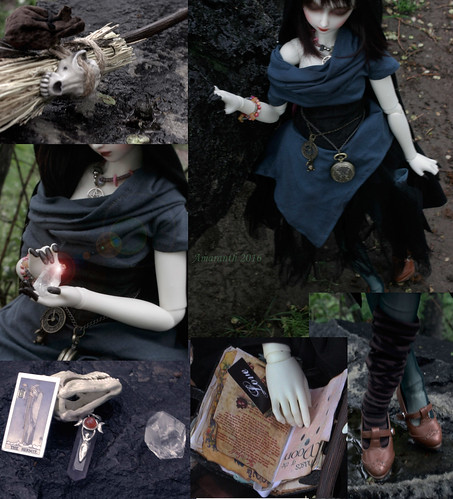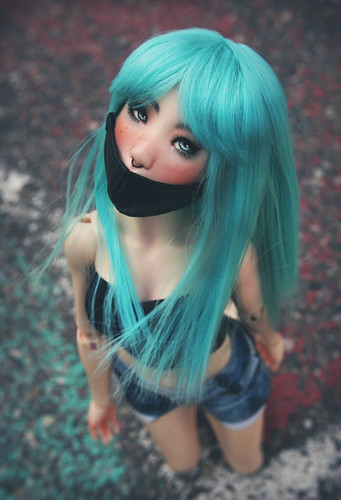Note: I plan to update this post when I can with some examples of yellowing from my personal collection.
You can't reverse yellowing. The good news is that yellowing is very, very gradual. You're not going to see severe yellowing in your doll just from walking to your car and back. They may mellow within a year or so, but you will not see severe yellowing for the most part until after many years of love and play.
Most people find they barely notice the yellowing, because it is something that happens so slowly you often don't notice until you compare the inside of a doll's headcap or a newer doll from the same company to an older one.
Is Yellowing Damage?
In most cases, yellowing should not constitute damage. What yellowing can indicate in a newer doll is a lack of care and preservation for the doll itself. Blotchy yellowing, or the yellowing equivalent of a farmer's tan could be considered damage in most cases. You're obligated as an honest seller to disclose any yellowing. Personally, any doll at least a year or more I always note that it probably has some yellowing.
Contributors Toward Yellowing
Time:
Here's the deal, the thing we all know and dread: BJDs turn yellow overtime.
This is because red pigments are not very stable. This is why red hair dye doesn't last as long as most other colors, and why the brilliant reds in old paintings are often the first to go. With dolls and resin, the red pigments break down before the others, leaving behind a yellow (and in the case of very old Cerberus Project dolls and early Iplehouse tan even green) tint.
I'm not a chemist, so I cannot accurately translate what I've read regarding this pigment, but I can link anyone to more sources if they want. Reds pigments in all mediums are especially susceptible to fading or breaking down in sunlight.
For a little proof it isn't going to happen immediately, here is my original feeple 60 Miyu in white skin from 2014:
And here, a newer MDR Fang on a 2014 NS Feeple:
Light:
Store BJDs away from constant sources of light and heat, especially sunlight. Just like books and old photos will turn yellow when left in sunlight for too long, so will your dolls.
Taking your dolls out for photos will not damage them, nor will the flash of a camera. The damage and hastening of yellowing occurs only from prolonged exposure.
Oxygen:
Oxygen is another culprit that contributes toward yellowing. You can't avoid it, sadly, unless you've a vault built like the Vatican Archives. I personally don't stress over this one.
Recasts:
In my experience, recast resin always yellows faster, especially recast white resin. I do not know if this is true for all people, nor do I have solid science behind me, but I also believe this is because they use cheaper and less stable pigments in their resin. Your experiences may vary.
Smoke:
Cigarette smoke is a nasty beast that clings to everything it touches. Cigarettes yellow your teeth and the walls of your house, and it will contribute to your doll yellowing too. If you live with a smoker who does not wish to smoke outside, do your best to keep your dolls away from direct exposure to the smoke.
Tan/White Resin:
White resin shows the effects of yellowing more quickly than pinker/peachier shades of resin. The same is true of tan dolls. Old Iplehouse tan often began to green overtime, but they seem to have stabilized it for the most part.
An Ounce of Prevention is Worth a Pound of Cure
- Store your dolls in a cool (but not freezing!), mostly dark room. (This is also energy efficient. Don't leave lights on unnecessarily, and if you keep your windows open, make sure the dolls are not directly facing that window.)
- You can cover your dolls' shelf or display case with a curtain such as a blackout curtain to help to reduce sun exposure.
- Keep the lights in your dolls' display cabinet, if any, off.
- Avoid constant, direct exposure to sources of light, especially sunlight.
- Avoid exposure to cigarette smoke and other sources of smoke.
- Enjoy your doll. Yellowing is unavoidable, and should not stop you from enjoying your little resin friend.
Reversing or Correcting Yellowing
- You can bathe the doll in Oxyclean and certain other products to help bleach out the yellow pigments and "remove" or lighten the effects of yellowing.
- DD owners have a method for reducing yellowing or removing stains on their dolls detailed here. Please understand I have not tested these methods on resin, and I cannot be certain they work. I'll give it a test on an old recast part I have lying around sometime next year.
- Dye will cover yellowing.
These methods will often need to be repeated as the doll ages.
In my opinion, as doll making improves and we make advances in chemistry we will see more resilient and stronger shades of red and other pigments.
Nothing can be perfect forever. All we can do is love them for what they are. Perhaps there's some deep philosophical allegory that could be made here? Something about living in the present, the transience of beauty and material things…
Vintage toys and dolls will all show signs of wear, including fading colors and cracked plastics. We can't completely avoid yellowing and other signs of age in our toys, just like we can't avoid the effects of age on ourselves.
Thanks for reading, and as always happy collecting <3
Thanks for reading, and as always happy collecting <3


No comments:
Post a Comment
Thanks for reading! <3 I try to follow up on every comment my readers make.